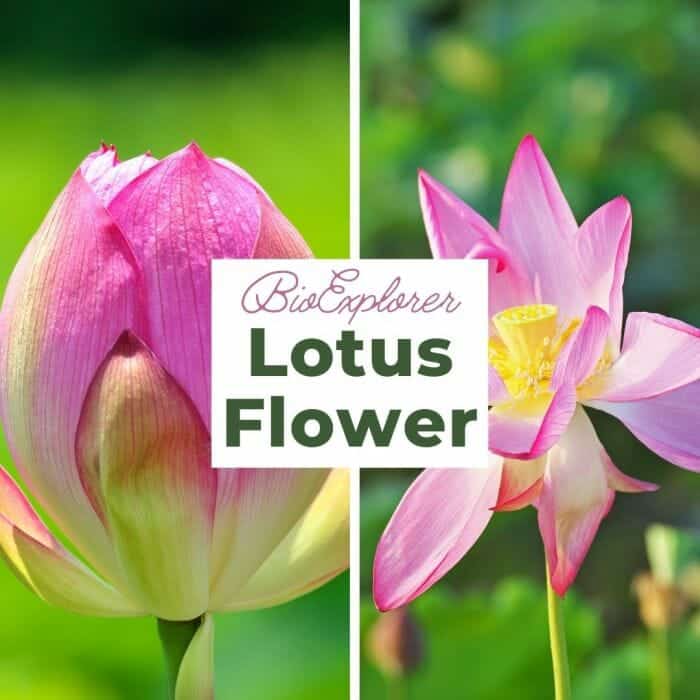
| Plantae | Magnoliopsida | Proteales | Nelumbonaceae | Nelumbo nucifera |
The lotus flower (Nelumbo nucifera) is an emergent aquatic plant that grows with its roots in the ground at the bottom of the water source and its flowers and leaves on its surface.
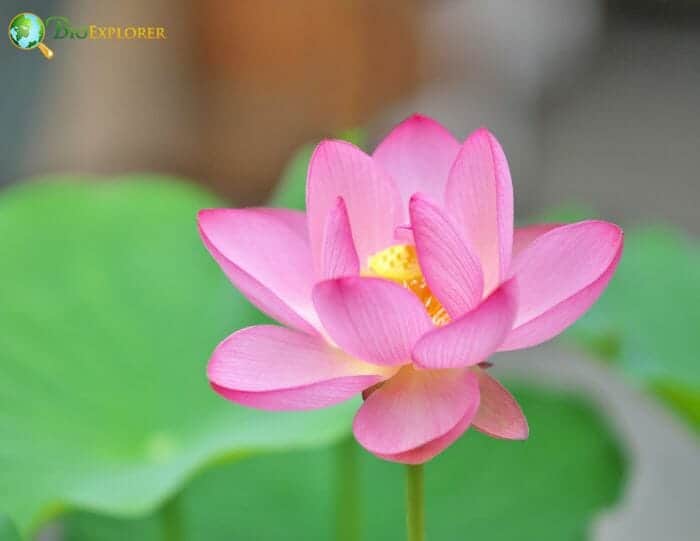
It is native to the tropical regions of Asia. It’s the national flower of Vietnam and India. Lotus, also known as simply lotus, sacred lotus, or Indian lotus, is one of two species[1] of aquatic plants in the Nelumbonaceae family.
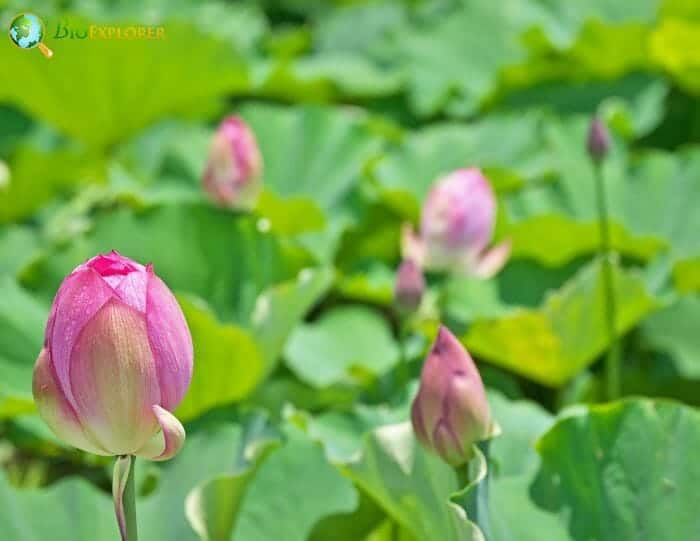
The lotus, sometimes mistakenly referred to as a water Lily, is available in shades from bright pink to white. The plant has 2 round leaves that typically float on the water.
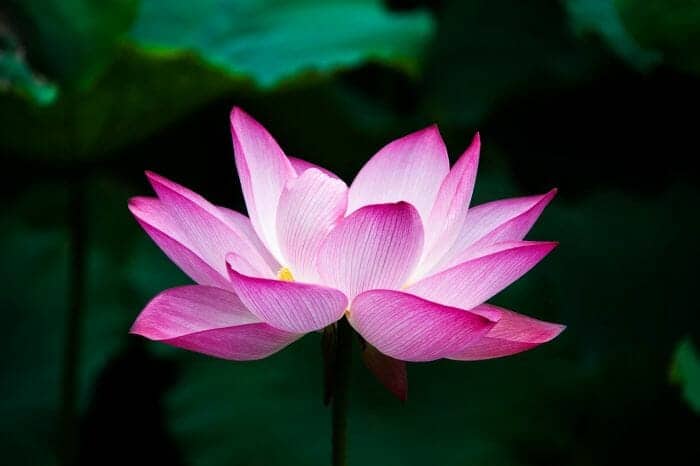
The flower is located on a stem above the leaves. The lotus ranges from small to large, with the giant leaves measuring two feet in diameter. Lotuses are beautiful and sacred flowers, making them a great addition to any water feature.
The lotus flower, a captivating blossom, is a testament to nature’s beauty and unwavering strength. Scientifically known as Nelumbo nucifera, this flower is not admired for its appeal but also revered for the profound symbolism it holds in various cultures. Despite growing in water, it blossoms untainted by the impurities around it, making it a universal symbol of purity and renewal.
In some cultures, it was linked to the sun and rebirth, while in Buddhism and Hinduism, it represents spiritual enlightenment and the purity of heart and mind. The gradual opening of its petals is often seen as an unfolding journey toward awareness. From Asia to Egypt and beyond, the lotus occupies a place across regions embodying not just a mere flower but an emblem deeply rooted in human history and spirituality.
Table of Contents
Health Benefits of the Lotus Flower

While primarily recognized for its significance across cultures, the lotus flower also possesses various health benefits that have been utilized for centuries. This aquatic marvel is not just visually appealing; it harbors medicinal properties that offer remedies for various ailments.
One notable health benefit attributed to the lotus is its role in promoting body equilibrium or balance (homeostasis). homeostasis refers to the body’s ability to maintain an internal environment despite external changes. The lotus plant contributes significantly to this balance by supporting bodily functions;
- Digestive System: Lotus seeds have long been recognized for strengthening the stomach and promoting digestion. They have been used in medicine as a remedy for diarrhea and stomach cramps.
- Cardiovascular Health: The lotus flower is believed to enhance blood circulation and help lower blood pressure, thereby supporting heart health.
- Mental Well-being: Consuming lotus seeds can have a soothing effect on the mind alleviating symptoms of stress and anxiety. Their sedative properties make them an appealing choice for those seeking sleep.
- Anti-inflammatory Properties: The lotus root, packed with minerals and nutrients, possesses inflammatory[1] properties that can effectively reduce swelling and alleviate pain.
- Abundant Antioxidants: Particularly found in its petals, the lotus flower offers a source of antioxidants[2] that combat free radicals in the body. This helps prevent damage and reduces the risk of diseases.
- Detoxification: Traditional practices often involve using lotus leaves to stimulate the body’s detoxification process, assisting in eliminating toxins from the system while promoting liver health[3].
Incorporating the lotus flower into your diet or wellness routine can provide an approach to maintaining health, promoting physical well-being and mental serenity. Its ability to support body balance and harmony showcases its advantages, establishing it as a regarded plant in traditional and modern medicinal practices.
Benefits of Lotus Flower for Skin & Hair
Apart from its spiritual and medicinal qualities, the lotus flower is special in beauty and personal care. Its natural components benefit skin and hair, making it an essential ingredient in skincare and haircare products.
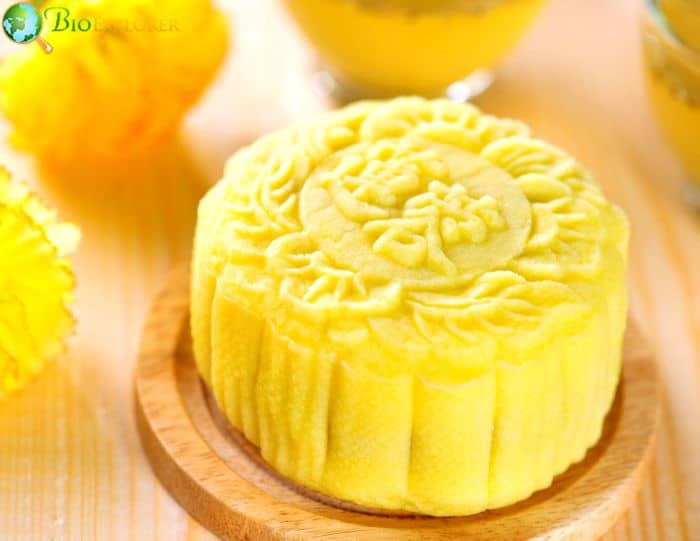
For Skin
- Moisturization: The lotus flower acts as a moisturizer by helping the skin retain moisture resulting in softness and suppleness.
- Anti-aging: Abundant in antioxidants, the lotus fights against radicals that accelerate aging. Regular use can diminish lines and wrinkles, giving the skin a youthful look.
- Soothing Properties: With its inflammatory properties, the lotus flower effectively calms irritated skin, making it particularly suitable for individuals with sensitive skin or conditions like rosacea.
- Enhanced Complexion: The lotus flower improves skin elasticity and complexion, providing radiance and glow.
Suggested Reading:
Explore The Cells of The Epidermis
For Hair
- Strength and Shine: Lotus extracts help strengthen hair follicles and promote growth. Additionally, they give the hair a shine, making it appear healthy and lustrous.
- Scalp Health: The antimicrobial properties of lotus extracts aid in combating dandruff and other scalp infections. Moreover, the lotus soothes the scalp reducing itchiness and dryness.
- Hair Conditioning: The moisturizing properties of lotus act as a conditioner, leaving your hair soft and easy to manage.
Suggested Reading:
25 Most Known Exotic Flowers
By incorporating the lotus flower into your beauty routine, you can experience revitalized skin and beautiful locks. Its numerous natural benefits make it a sought-after ingredient that promises beauty and overall health.
Interesting Facts About the Lotus Flower
The lotus flower has mesmerized the imagination for centuries with its beauty and profound symbolism. Apart from its known significance, the lotus is filled with intriguing facts that further enhance its reputation in the natural world.
Lotus Flower Historical Significance
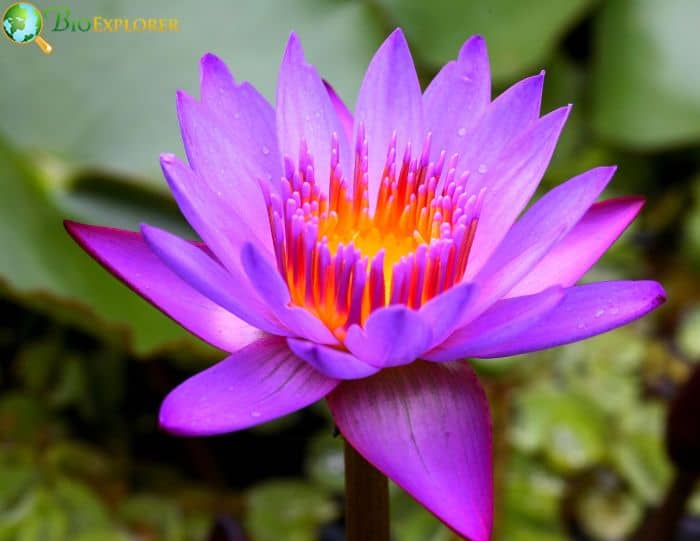
- Ancient Egypt: In Egyptian culture, the lotus held a special place. It was associated with the sun since it closes its petals at night only to bloom again at dawn, symbolizing rebirth and regeneration. The flower was also linked to the goddess Isis representing creation and resurrection[4].
- Buddhism and Hinduism: In these religions, the lotus holds deep symbolism representing purity, spiritual awakening, and enlightenment. The growth of the lotus, from the depths to the surface of the water, is believed to signify emergence and new beginnings. Many revered deities like Lakshmi and Saraswati in Hinduism as Buddha in Buddhism are often depicted gracefully seated upon a lotus.
Lotus Flower Unique Characteristics
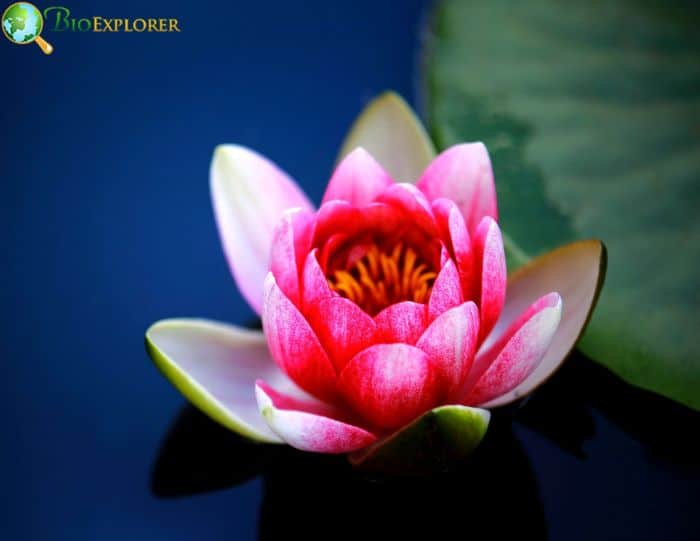
- Self-Cleaning Ability: The lotus possesses a characteristic called the “lotus effect“. Its leaves have the quality of being superhydrophobic, meaning they repel water. This fascinating ability allows water droplets to roll off the surface effortlessly, removing any dirt or impurities. Essentially it enables the plant to clean itself.
- Thermal Regulation: Astonishingly, the lotus can regulate the temperature of its flowers for warm-blooded animals. This serves a purpose in attracting pollinators since the gentle warmth offers them respite from conditions.
- Longevity: Lotus seeds possess a lifespan that’s truly awe-inspiring. There have been instances where seeds dating back 1,300 years have successfully germinated, making them one of the known natural seeds.
These captivating aspects of the lotus flower emphasize its significance and showcase its extraordinary adaptability and resilience within our natural world.
Lotus Symbolism in Spirituality
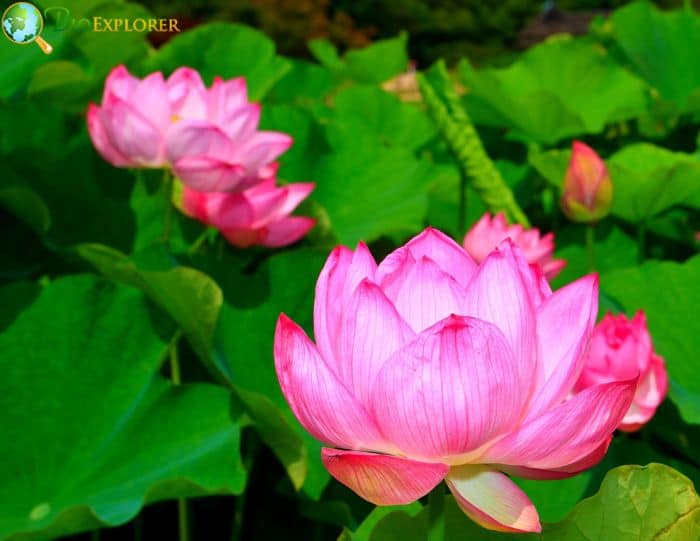
- Purity and Rebirth: The Lotus’ journey from darkness to light represents the emergence of individuals. Despite its roots in waters, it blossoms flawlessly, symbolizing a heart, mind, and potential for personal growth.
- Enlightenment: The unfolding petals of the lotus are often seen as stages of soul expansion and enlightenment. They remind us that in circumstances, beauty and grace can emerge.
Suggested Reading:
Exploring the Top 50+ Most Exquisite Purple Flowers in the World
Significance in Different Religions and Cultures;

- Buddhism: The lotus is closely tied to Buddha’s teachings embodying purity, spiritual awakening, and unwavering devotion. In Buddhism, different colored lotuses hold meanings; white signifies purity, while pink represents Buddha’s history.
- Hinduism: In Hindu culture, the lotus is associated with divinity, fertility, wealth, and knowledge. Deities like Vishnu and Lakshmi are often portrayed with lotus flowers to symbolize their purity, beauty, and abundance.
- Egypt: In the eyes of the Egyptians, the lotus held significance as a symbol of new beginnings and the sun. They admired how it closes during the night and gracefully reopens at dawn.
Throughout the tapestry of history, the lotus flower has served as a beacon of hope, embodying resilience and testifying to the enduring spirit of humanity. Its appeal lies in its simplicity and the profound meanings it represents.
Quotes about Lotus Flowers and Their Meanings
The lotus flower’s symbolism has inspired thinkers, poets, and spiritual leaders. Here are some popular quotes related to this flower, along with their interpretations;
“Be like a lotus. Let the beauty of your heart speak.“
Interpretation: This quote emphasizes the importance of beauty and purity. Like how a lotus remains unaffected by waters, individuals should let their inherent virtues and goodness radiate regardless of external circumstances.
“Just like the lotus, we too can rise from the mud, bloom out of the darkness, and radiate into the world.“
Interpretation: This quote speaks to our human resilience and innate growth potential. No matter our difficulties or hardships, we have the strength to overcome them. Make an impact on others.
“Whenever you should doubt your self-worth, remember the lotus flower. Even though it plunges to life beneath the mud, it does not allow the dirt surrounding it to affect its growth or beauty.“
Interpretation: This serves as a reminder to hold onto self-worth and persevere regardless of circumstances. The lotus flower symbolizes resilience, emphasizing that factors should not influence one’s growth and value.
Can You Eat Lotus Flower?
Apart from its aesthetic significance, the lotus flower also holds a place in the culinary world. It is indeed edible, and various parts of this plant are used in dishes across many cultures.
Edible Parts of the Lotus

- Seeds: The seeds, often called lotus nuts, can be enjoyed raw, roasted, or boiled. They have a nutty taste and are commonly used in desserts or soups.
- Roots: The distinctive wheel-shaped lotus root is a staple ingredient in cuisines. Lotus root has a crunch. It can be cooked in different ways, such as stir-frying, boiling, or pickling.
- Petals: Although commonly eaten, the petals of the lotus flower can be used to garnish dishes or brewed into tea.
Culinary Significance and Popular Dishes of Lotus

- Lotus Seed Soup: This Chinese dish is well-loved during hot weather as it is believed to have cooling properties.
- Stir-fried Lotus Root: A common dish in Chinese and Japanese cuisines where the root is stir-fried with vegetables and seasonings.
- Lotus Tea: Made by steeping dried lotus petals, this tea has a wonderful aroma and is thought to offer various health benefits.
Incorporating lotus flowers into your diet not provides a flavor experience but also offers nutritional benefits creating a delightful combination of taste and health.
Scientific Studies on the Lotus Flower
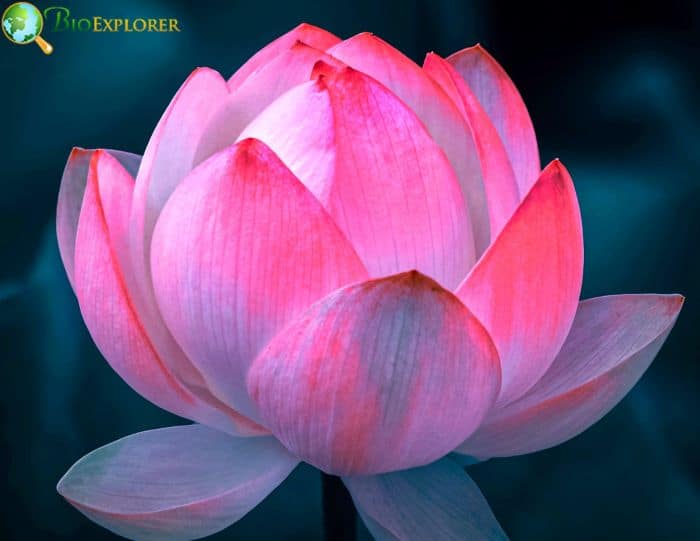
Scientific studies have also taken an interest in the lotus flower beyond its spiritual significance. Researchers have explored its properties and potential benefits from a perspective.
- One notable aspect is the presence of phytochemicals in lotus flowers. These are naturally occurring compounds found in plants that have been found to possess health advantages. The lotus flower contains elements such as flavonoids, alkaloids, and tannins. These components possess properties that are beneficial for health, including anti-inflammatory and anti-cancer effects.
- Recent studies have shown that the lotus flower can combat stress due to its high antioxidant content. This can help prevent damage to cells and reduce the risk of diseases.
- Some research suggests that lotus seeds may have effects and potentially be used to treat diseases.
Furthermore, recent studies have indicated that extracts from lotus leaves may have obesity effects by inhibiting the absorption of fats and carbohydrates. This can be helpful for weight management.
The scientific exploration of the lotus flower has shed light on its benefits. While traditional uses have long recognized its virtues, modern science is now. Expanding our understanding of this plant.
Conclusion
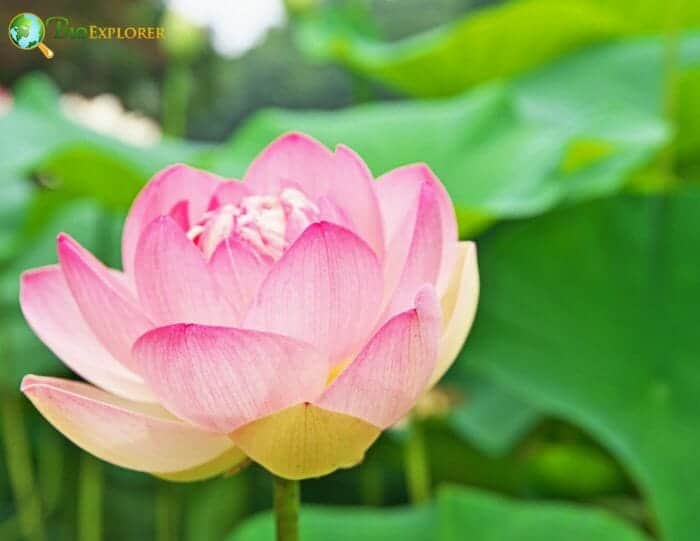
The lotus flower symbolizes purity, resilience, and enlightenment. Its presence throughout history has left a lasting impact on cultures, religions, and scientific research. From emerging from the waters to becoming a radiant symbol of hope and inspiration, it serves as a beacon for many individuals.
The lotus holds importance not spiritually but also in its numerous health, skincare, haircare, and culinary advantages. It is remarkable how nature has given us such a range of benefits through the lotus. From its significance to the evidence supporting its qualities today, the lotus is a testament to the extraordinary wonders in our natural world. It invites us to delve into its secrets, encouraging us to explore and fully appreciate the blessings it offers humanity.













